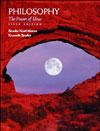 |
1 |  | 
Which ancient philosophical tradition did Plotinus represent? |
|  | A) | Stoicism |
|  | B) | Epicureanism |
|  | C) | Skepticism |
|  | D) | Neoplatonism |
 |
 |
2 |  | 
St. Augustine rejected this Neoplatonic claim. |
|  | A) | There are two realms to reality. |
|  | B) | The immaterial realm is more real than the physical realm. |
|  | C) | The ground of all reality, knowledge, and truth lies beyond the physical world. |
|  | D) | The highest reality is the One, an impersonal, indefinable, and indescribable god. |
 |
 |
3 |  | 
What do Pyrrhonic skeptics maintain? |
|  | A) | Nothing can be known. |
|  | B) | People should suspend judgment about all things. |
|  | C) | Some topics of inquiry are unknowable. |
|  | D) | Some sources are ruled out as sources of knowledge. |
 |
 |
4 |  | 
What is asserted by the principle of noncontradiction? |
|  | A) | People who don't contradict themselves are rational. |
|  | B) | A proposition and its contradictory opposite cannot both be false at the same time. |
|  | C) | A proposition and its contradictory opposite can't both be true at the same time. |
|  | D) | If two propositions don't contradict each other then both of them are true. |
 |
 |
5 |  | 
Which argument did St. Augustine use to refute total Academic skepticism? |
|  | A) | When we are in doubt we can at least know that we exist as a doubter. |
|  | B) | Memory can give us accurate knowledge of past events. |
|  | C) | Statistically speaking, if you believe enough things you can know that you are bound to be right about some of them. |
|  | D) | God guarantees that our clear and distinct perceptions and ideas will be true. |
 |
 |
6 |  | 
What did Hypatia think about the study of mathematics and astronomy? |
|  | A) | They were useful in finding practical solutions to practical problems on earth. |
|  | B) | They were an amusing diversion and, like philosophy, just idle speculation. |
|  | C) | They were a way of proving the truth of Christianity. |
|  | D) | They were part of a way of life and a means of testing the implications of Platonic and Neoplatonic metaphysics and epistemology. |
 |
 |
7 |  | 
How did St. Thomas Aquinas distinguish philosophy from theology? |
|  | A) | Philosophy is limited to the natural world and theology is limited to the supernatural world. |
|  | B) | Philosophy is based on reason while theology is based on divine revelation and faith. |
|  | C) | Philosophy is a source of ignorance, error, and illusion while only theology can give us truth. |
|  | D) | Theology is dependent on philosophy but not vice versa. |
 |
 |
8 |  | 
Which view did Aquinas accept? |
|  | A) | A physical thing is matter plus form. |
|  | B) | All reality is material. |
|  | C) | Forms exist independently of matter. |
|  | D) | Nothing changes. |
 |
 |
9 |  | 
Which view of Aristotle's did Aquinas disagree with? |
|  | A) | Physical things are always a blend of matter plus form. |
|  | B) | The essence of a thing is the same as its existence. |
|  | C) | One and the same form (universal) can be in more than one physical thing (particular). |
|  | D) | Change is explained in terms of four causes, the formal, material, efficient and final. |
 |
 |
10 |  | 
What did Aquinas maintain concerning the human soul? |
|  | A) | It is the passive potentiality of the body. |
|  | B) | It is finite and destructible. |
|  | C) | It cannot exist without the body. |
|  | D) | It is a direct creation of God. |
 |



 2002 McGraw-Hill Higher Education
2002 McGraw-Hill Higher Education